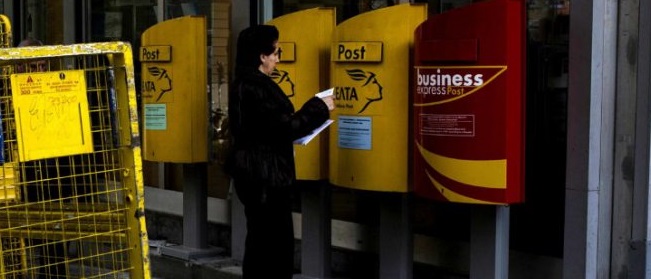The discovery on Monday come in the wake of letter bombs that were sent to the German Finance Ministry and the Paris office of the International Monetary Fund last week. A small explosion injured a member of staff at the IMF offices in Paris, but not the addressee.
The Greek militant group, Conspiracy Cells of Fire [Synomosia Pyrinon Tis Fotias] , has claimed responsibility for the German attack, describing it as part of a campaign of violence against international financial institutions. The bomb contained low-grade explosives but was destroyed Wednesday before it could explode.
No injuries were reported in Monday’s raid on the postal sorting office. Greek law enforcement gave no additional details, but confirmed that the parcels had been falsely labelled.
The Greek group that claimed responsibility for the German bombing, Conspiracy Cells of Fire, claimed in an online posting on Thursday that the attack was part of a concerted campaign by international anarchist groups.
“We sent parcel bomb to the German finance minister as part of the second act of the Project Nemesis campaign. Watch for more announcements in the future.”
The letterbomb intended for Schäuble, contained explosive substances and was designed to cause severe injuries when opened.
Greek authorities were meanwhile examining information on evidence from Paris. They also expressed hope that the injured IMF secretary would furnish more details about the sender’s address, according to a Greek ministry official.
The IMF secretary was injured by shrapnel in the face and burst an eardrum as a result of a “rather violent noise,” Paris police chief Michel Cadot said. It detonated as she opened the parcell, burning her hands too.
The explosive device was a “large black cylinder, about 30cm long”, with the blast radius so large the room’s ceiling was hit by shrapnel, French law enforcement told The Independent.
The blast caused the building to be evacuated and put on a security lockdown.
The device was intended for the IMF’s European representative, Jeffrey Franks, who has been in his post since March 2015. He has worked for the IMF for 24 years.
A Greek public order ministry official said French authorities sent Greece’s anti-terrorism squad photographic evidence of the blast site. The official spoke to The Associated Press on condition of anonymity because he was not authorized to brief reporters on the record.
He said evidence pointed towards a single perpetrator so far. “It looks as if it could be a repeat of 2010,” when Conspiracy Cells of Fire sent a series of explosive parcels to the offices of European politicians — including German Chancellor Angela Merkel — and foreign embassies in Athens.
French IMF director Christine Lagarde, learned about the explosion while on a visit to Germany. “I condemn this cowardly act of violence and reaffirm the IMF’s resolve to continue our work in line with our mandate,” she said in a statement.
All four floors of the building in Paris where the explosion happened, were searched by police. The building not only houses the IMF but also the World Bank office in France.
According to Cadot the IMF office had received threatening phone calls in recent days but told AP that the calls were not necessarily linked to Thursday’s incident.
Internally, Greek post offices, embassies, and financial organizations have been ordered to take extraordinary measures to beef up security, after Paris investigators found “residues of Greek stamps” on the letter that exploded at the IMF.
Greece’s Public order minister Nikos Toskas said that whoever sent the Paris’ letter bomb used the name of a senior Greek conservative opposition lawmaker, Vassilis Kikilias, and “the address of an office that is no longer in use”.
The package, addressed to German Finance Minister Wolfgang Schaeuble, had also listed Adonis Georgiadis, the vice-chairman of Greece’s conservative New Democracy Party, as its sender.
Toskas confirmed on Greece’s Antenna TV that the failed letter bomb sent Wednesday to the German Finance Ministry also had the name of a false sender, Georgiadis on the envelope.
Toskas told Skai TV, that the “main thrust” of the Greek investigation was to determine how two parcel bombs evaded checks at the Athens airport.
Greeks are unhappy about the austerity measures imposed by the IMF and the European Union linked to an international bank bailout of their financially strapped country.














No comments.
By submitting a comment you grant Free West Media a perpetual license to reproduce your words and name/web site in attribution. Inappropriate and irrelevant comments will be removed at an admin’s discretion. Your email is used for verification purposes only, it will never be shared.